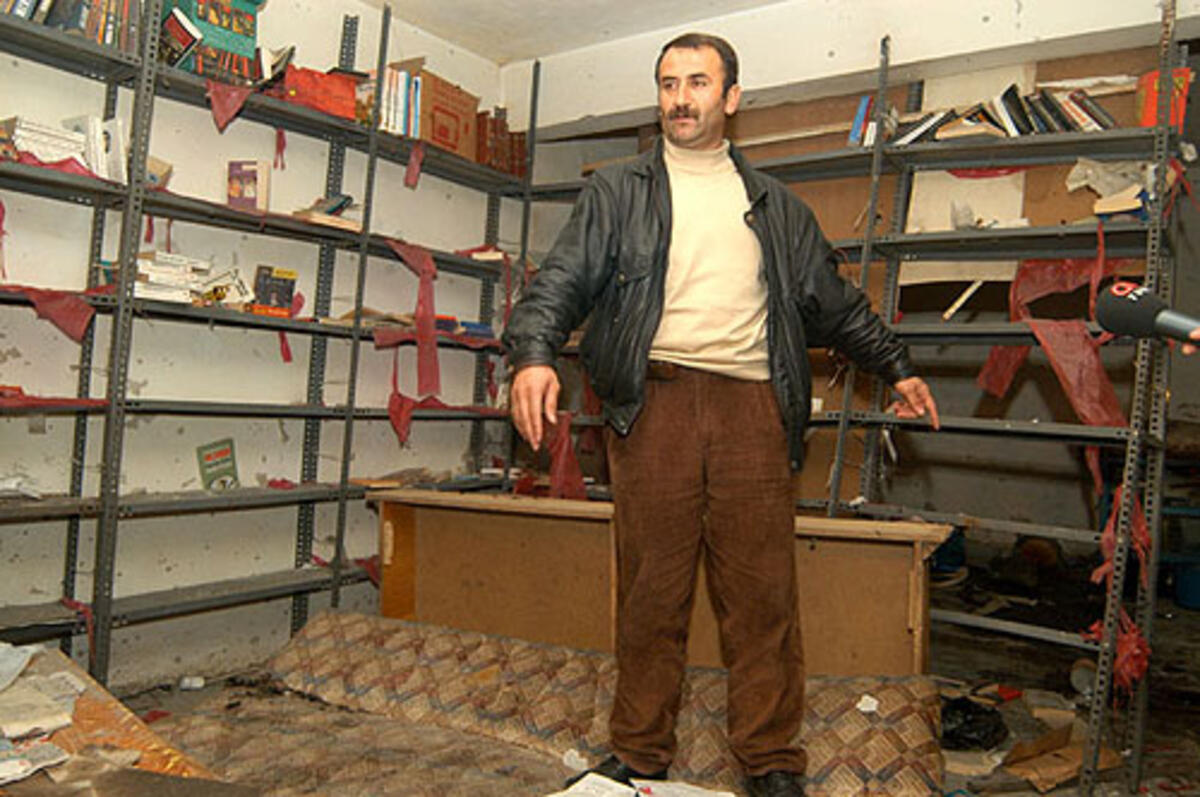In the new trial of the bomb attack against the Umut (Hope) bookstore in Şemdinli, the public prosecutor's office pleads for the acquittal of the three ex-agents of the Turkish counter-guerrillas for lack of evidence.
The Turkish judiciary is once again preventing the truth from emerging about a state crime against Kurds, thus nourishing a culture of impunity. There is apparently no accountability for perpetrators in the "south-east" of the country. Not even if the perpetrators are caught in the act.
Background
It is November 9th, 2005. Seferi Yılmaz, owner of the first bookstore in Şemdinli, a Kurdish resistance stronghold in the province of Hakkari, is about to sit down with his two employees to eat when he thinks he sees a customer. He walks a few steps towards the door, and the next moment the first hand grenade is thrown into the shop. He just manages to shout "bomb" to warn his colleagues. Then he runs out and goes in pursuit of the attacker. At the moment, his employees are in the back of the bookstore. Zahir Korkmaz is fatally hit by shrapnel, and his cousin Metin Korkmaz is seriously injured.

Two JIT agents, one PKK deserter
The perpetrators are a three-man special unit from the JIT military intelligence service - Death Squads of the so called Deep State: Ali Kaya and Özcan İldeniz, two military officers with the rank of sergeant. The third man is Veysel Ateş, a PKK deserter. They are the men who attacked Seferi Yılmaz's shop.
The man who runs the bookstore, Yılmaz, in addition to his involvement in Kurdish local politics is considered a “great enemy”. Because when guerrilla commander Mahsum Korkmaz (Nom de Guerre: Egîd) fired “the first shot” of the PKK on August 15, 1984 in Eruh and thus initiated the armed liberation struggle against the Turkish occupation forces, Seferi Yılmaz was in the “armed men Propaganda Unit March 21” and fired the second shot in Şemdinli. He spent fifteen years in prison for this.
The attack against the Umut bookstore was witnessed in anger by the people of Şemdinli. They stopped the getaway car registered in a Jandarma man’s name and captured the occupants. In the trunk they found hand grenades made in Germany, Kalashnikovs and ammunition, as well as a plan with targets and a death list containing the names of 105 people who allegedly supported the PKK. The name of Seferi Yılmaz was highlighted in red and on top of the list. The trio was handed over to the police.
The next day, a soldier tried to prevent a public prosecutor from inspecting the crime scene and examining the gateway vehicle by shooting at the crowd from a moving car. Again one person was killed and around 20 others were injured. The population then erected barricades and stormed a police station. Protests broke out in several Kurdish cities and in front of the Turkish Interior Ministry in Ankara. In the provincial capital Hakkari, some people were injured when the police used tear gas and firearms against a demonstration with around 3,000 participants. Almost 10,000 people from all over the province flocked to Şemdinli for the funeral of those killed.

Systematic delay in proceedings
On June 19, 2006, a civil court in Van sentenced Ali Kaya, Özcan İldeniz and Veysel Ateş to 39 years and five and a half months' imprisonment for murder, criminal association, and attempted murder. On May 16, 2007, the Court of Cassation as the highest court upheld an action for annulment on the grounds of inadmissibility and ordered a retrial. The file was handed over to the Van Military Court. The then chief of staff, Yaşar Büyükanıt, laid the groundwork for the proceedings by praising the perpetrators as “good guys”. On December 14 of the same year the arrest warrants were ordered to be lifted and the death squad was released. The proceedings were delayed for over two years until the file was finally sent to a criminal court in Hakkari on January 22, 2010. The case ended up in an arbitration tribunal. On May 2, 2011, the file was back in Van.
Messy trial
The trio were arrested again five weeks later. On January 10, 2012, the state killers were sentenced to 39 years and five and a half months in prison on the same charges. The indictment was drafted by Ferhat Sarıkaya, ex-chief prosecutor in Van. The judge also investigated Yaşar Büyükanıt for abuse of office and the establishment of an illegal body. Sarıkaya accused the then number two in the Turkish military hierarchy of having ordered a whole series of attacks against Kurds, including the attack on the Umut bookstore. Ten years later, after the pseudo-coup in the summer of 2016, Sarıkaya suddenly announced that he had been pressured by “Gülenists in the police apparatus” to name Büyükanıt in connection with the Şemdinli attack. The death squad then requested a retrial, which opened on October 11, 2017. The perpetrators were released and were subsequently acquitted of the charge of “criminal association”.
A painful collective experience
The new trial has been going on since 2018, and the 14th hearing took place on Thursday. With regard to the impunity of the perpetrators, Kadir Kutevi, attorney for the second prosecution, spoke of a “painful collective experience” that had shaped Kurdish society as a whole. The common trauma is active because the actors enjoy a life in freedom and are not punished for their actions. Şemdinli as a whole was outraged by this dynamic said Kutevi. The prosecutor reiterated that no sufficient evidence of criminal acts by the defendants could be obtained. The trial will continue on December 20.
















